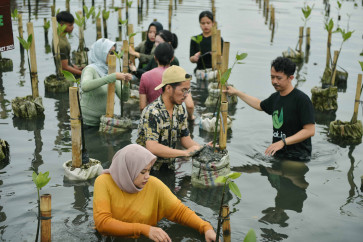Popular Reads
Top Results
Can't find what you're looking for?
View all search resultsPopular Reads
Top Results
Can't find what you're looking for?
View all search resultsWhy harmonization of laws on carbon trading is urgent
For some, the carbon-trading sector may seem overregulated, but in actuality, there are also matters that remain unregulated.
Change text size
Gift Premium Articles
to Anyone
I
n the last several months, the government has introduced numerous policies related to carbon trading. Some are still being finalized, such as the draft Financial Services Authority (OJK) regulation pertaining to carbon exchange and the draft Environment and Forestry Ministry regulation on the implementation of offshore carbon trade and other specific purposes.
The environment and forestry minister has also enacted Ministerial Decree No. 716/2023 on the integration of carbon economic value mechanisms in partnership approval and business licensing in the environment and forestry sector. The finance minister followed with the issuance of Ministerial Decree No. 272/2023 on the determination of types of exported natural resource goods obligated to contribute to export proceeds into the Indonesian financial system.
The new regulations and draft regulations were devised to implement Presidential Regulation No. 98/2021 on the enforcement of carbon economic value to achieve nationally determined contribution (NDC) targets and greenhouse gas control in national development alongside its implementing regulation, namely Environment and Forestry Ministerial Regulation No. 21/2022 on implementation of carbon economic value. The arguably instantaneous enactment of these regulations constitutes an effort to support the commencement of the Indonesian carbon exchange, which is set to open in the last quarter of this year.
For some, the carbon-trading sector may seem overregulated, but in actuality, there are also matters that remain unregulated. Before the carbon exchange is open for both domestic and foreign trading, all regulations pertaining to carbon trading must be synchronized to ensure that the carbon exchange can meet the NDC applicable to parties to the Paris Climate Change Convention, culminating in 2027 to 2030. This is in line with the views of the OJK, as illustrated in the road map issued late last month.
The urgency for harmonization of carbon-trading regulations is to prevent inefficient management of the carbon exchange. Essentially, the purpose of an exchange is to increase the value of the relevant commodity by means of arranging the ecosystem within the exchange itself. In accordance with the Development and Strengthening of the Financial Sector Law, the OJK is the institution in charge of carbon exchange.
The exchange is, simply, the means to form a market in which the buyers of greenhouse gas emissions are able to meet sellers who are equipped with the certificate of greenhouse gas emission reduction (SPE-GRK) as stipulated under Environment and Forestry Ministerial Regulation No. 21/2022.
At the moment, the main concern is that the exchange will need markets and buyers, but the formula used to calculate the applicable SPE-GRK volume may not be acknowledged by many markets and buyers who use the Verra or Gold standards. The difference causes a discrepancy between the volumes of the verified carbon units (VCUs) listed in the SPE-GRK and that calculated using the Verra and Gold standards.



















